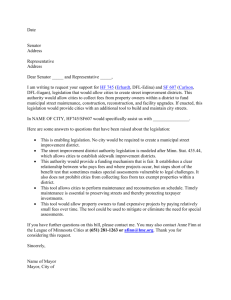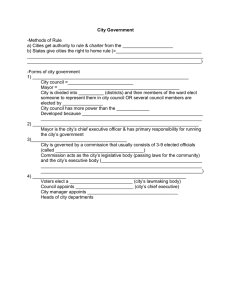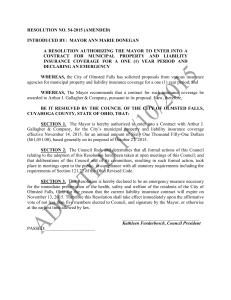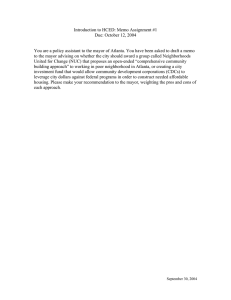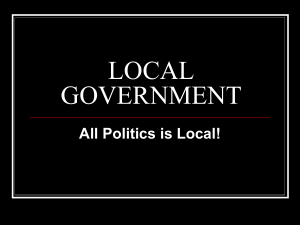F FAQ G
advertisement
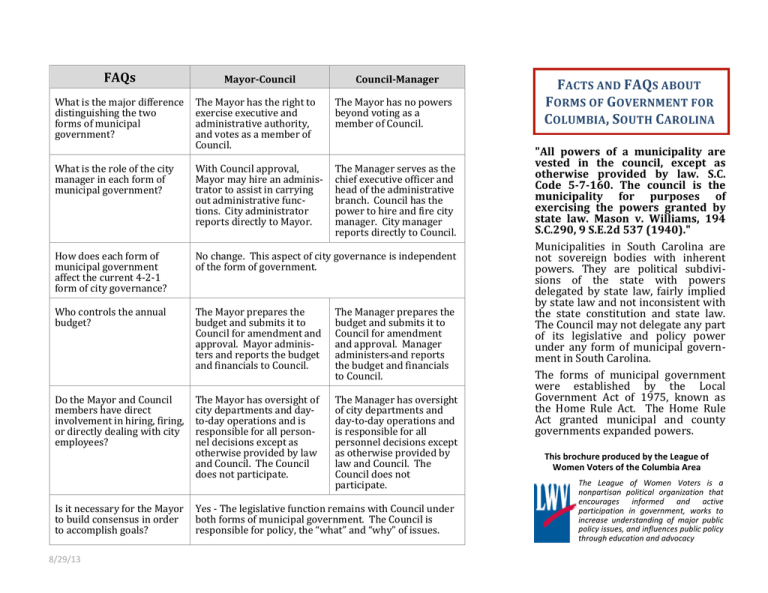
FAQs What is the major difference distinguishing the two forms of municipal government? Mayor-Council Council-Manager The Mayor has the right to exercise executive and administrative authority, and votes as a member of Council. The Mayor has no powers beyond voting as a member of Council. What is the role of the city manager in each form of municipal government? With Council approval, Mayor may hire an administrator to assist in carrying out administrative functions. City administrator reports directly to Mayor. The Manager serves as the chief executive officer and head of the administrative branch. Council has the power to hire and fire city manager. City manager reports directly to Council. How does each form of municipal government affect the current 4-2-1 form of city governance? No change. This aspect of city governance is independent of the form of government. Who controls the annual budget? The Mayor prepares the budget and submits it to Council for amendment and approval. Mayor administers and reports the budget and financials to Council. The Manager prepares the budget and submits it to Council for amendment and approval. Manager administers and reports the budget and financials to Council. Do the Mayor and Council members have direct involvement in hiring, firing, or directly dealing with city employees? The Mayor has oversight of city departments and dayto-day operations and is responsible for all personnel decisions except as otherwise provided by law and Council. The Council does not participate. The Manager has oversight of city departments and day-to-day operations and is responsible for all personnel decisions except as otherwise provided by law and Council. The Council does not participate. Is it necessary for the Mayor to build consensus in order to accomplish goals? 8/29/13 Yes - The legislative function remains with Council under both forms of municipal government. The Council is responsible for policy, the “what” and “why” of issues. FACTS AND FAQS ABOUT FORMS OF GOVERNMENT FOR COLUMBIA, SOUTH CAROLINA "All powers of a municipality are vested in the council, except as otherwise provided by law. S.C. Code 5-7-160. The council is the municipality for purposes of exercising the powers granted by state law. Mason v. Williams, 194 S.C.290, 9 S.E.2d 537 (1940)." Municipalities in South Carolina are not sovereign bodies with inherent powers. They are political subdivisions of the state with powers delegated by state law, fairly implied by state law and not inconsistent with the state constitution and state law. The Council may not delegate any part of its legislative and policy power under any form of municipal government in South Carolina. The forms of municipal government were established by the Local Government Act of 1975, known as the Home Rule Act. The Home Rule Act granted municipal and county governments expanded powers. This brochure produced by the League of Women Voters of the Columbia Area The League of Women Voters is a nonpartisan political organization that encourages informed and active participation in government, works to increase understanding of major public policy issues, and influences public policy through education and advocacy Comparison of Functional Responsibilities of Forms of Municipal Government i ii Functional Responsibility Legislative and policy power amends and approves budget, sets limits for changes within and between budget items Council-Manager Council Council sells or leases property Council Council levies taxes for general fund or specific purpose Council Council authorizes bond issues and assessments Council Council creates municipal courts and appoints municipal court judges Council Council enacts zoning ordinances and implementing regulations Council Council authorizes engaging in community development activities Council Council Mayor Manager Executive and administrative authority appoints, sets salaries, and removes employees at will i Mayor-Council prepares, administers, and reports budget and financials Mayor Manager oversees city departments and all day-to-day operations Mayor Manager responsible for all personnel decisions, except where provided by law and Council Mayor Manager reports to Council on the operations of departments Mayor Manager Resource - “Forms and Powers of Municipal Government, An Elected Official’s Guide from the Municipal Association of SC” ii There is a third authorized form of municipal government called a “Council” form, which is not described above because it is not being considered as an option in the City of Columbia. 8/29/13
